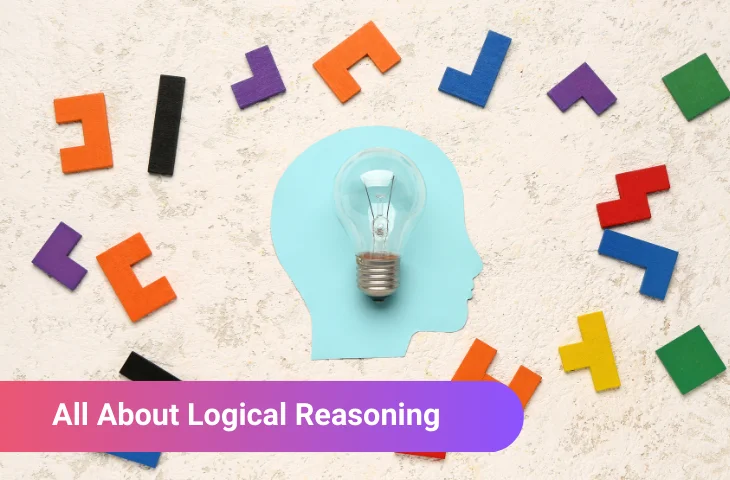Logical Reasoning is a key part of Reasoning. In every exam, be it SSC, Banking, Insurance, Railways, Defence Services, or UPSC, questions from topics under logical reasoning are common. Understanding the topic itself will allow aspirants to cover half of the reasoning syllabus.
Logical Reasoning is also very popular among aspirants, not because it is easy to solve, but because it is highly scoring. In this blog, we have provided the definition of Logical Reasoning, types of logical reasoning questions, subtopics under logical reasoning, along with the most common exams where questions from this topic are a must.
What Do You Mean by the Term Logical Reasoning?
Logical reasoning is all about thinking clearly and solving problems based on given information. It tests your ability to analyze, deduce, and make smart decisions.
In exams, it’s a key section that can boost your score if approached smartly.
Take Your Next Logical Reasoning Test Series
What Are the Various Forms of Logical Reasoning?
Logical Reasoning are mainly of two main type verbal and non-verbal. Both test your thinking but in slightly different ways verbal focuses on logic with words, whereas non-verbal on visualization.
- Verbal Reasoning: Deals with words, letters, and numbers. Examples: Syllogisms, blood relations, coding-decoding.
- Non-Verbal Reasoning: Deals with shapes, patterns, and figures. Examples: Series of figures, cubes, mirror images.
Topics Comes Under Verbal Reasoning
Topics that come under verbal reasoning are about spotting patterns and drawing conclusions. Common verbal reasoning topics include:
- Alphanumeric Series
- Syllogisms
- Blood Relations
- Coding-Decoding
- Direction Sense & Distance
- Statement & Conclusion
- Cause & Effect
- Calendar Reasoning
- Clock Reasoning
Get to know the detailed Bank Exam Syllabus
Topics Comes Under Non-Verbal Reasoning
Topics that come under verbal reasoning are about identifying patterns and thinking in 3D. Non-verbal reasoning is more visual. Key topics:
- Series of Figures
- Paper Folding / Cutting
- Mirror & Water Images
- Cubes & Dice
- Embedded Figures
- Figure Classification & Odd One Out
- Pattern Completion
Check out 100 Reasoning Questions with Solution for IBPS RRB
Exams That Include Logical Reasoning Questions
Logical reasoning questions were being asked in most competitive exams:
- Banking: SBI PO/SBI Clerk, IBPS PO/IBPS Clerk, RBI Grade B
- Staff Selection Commission: SSC CGL, SSC CHSL, SSC JE
- Railways: RRB NTPC, Group D
- Insurance: LIC AAO, NICL AO
- Other Govt Exams: UPSC, State PSC, NABARD, Defence exams
Also Check: What are the Upcoming Government Exams
How to Solve Logical Reasoning Questions Quickly?
To solve reasoning questions quickly must follow the below mentioned tricks:
- Understand the Question First: Don’t rush; read carefully.
- Identify Patterns: Look for sequences, repetitions, or rules.
- Use Shortcuts: Learn tricks for series, coding-decoding, directions, and blood relations.
- Skip and Return: Don’t waste time on tough questions attempt easier ones first.
- Practice Daily: Even 20–30 minutes daily improves speed drastically.
What Details Should Aspirants Keep in Mind While Solving Logical Reasoning Questions?
While solving reasoning questions, aspirants must pay attention to certain details in the question. If missed, the entire question can be answered incorrectly, causing aspirants not only to lose marks but also to panic, which can further reduce their score. The details to be avoided while solving logical questions are as follows:
- Misreading Questions: Small words like “not” or “except” can change the meaning.
- Skipping Steps: Jumping to answers without proper reasoning often leads to mistakes.
- Overcomplicating Problems: Keep it simple draw diagrams for clarity.
- Less Practice: Logical reasoning improves with practice; ignoring it can cost marks.
- Poor Time Management: Spending too long on one question affects the entire section.
Aspirants, as of now, you have an idea about how to solve and practice Logical Reasoning questions. You can also join Oliveboard courses and learn from expert faculties before applying for the next competitive exam.
FAQs
It depends on practice; regular practice makes it one of the most scoring sections.
By practicing daily, learning shortcuts, and solving mock tests regularly.
The main types are Verbal Reasoning (syllogisms, coding-decoding, blood relations) and Non-Verbal Reasoning (series of figures, cubes, mirror images).
Avoid misreading questions, skipping steps, overcomplicating problems, poor time management, and lack of practice.
Yes, shortcuts exist for series, coding-decoding, blood relations, directions, and statement & conclusion questions.
- RRB Section Controller 2026 Question Papers, Shift-Wise PYPs, Download PDFs
- Top Reasoning Questions for RRB Technician, Download Free PDF
- Top RRB ALP MCQ Questions, Download Free PDF
- Top RRB ALP Mechanical Engineering Questions, Download Free PDF
- ESI & ARD Practice Questions for NABARD Grade A 2026
- NABARD Grade A Practice Quiz, Download Free PDF

Hi, I’m Aditi. I work as a Content Writer at Oliveboard, where I have been simplifying exam-related content for the past 4 years. I create clear and easy-to-understand guides for JAIIB, CAIIB, and UGC exams. My work includes breaking down notifications, admit cards, and exam updates, as well as preparing study plans and subject-wise strategies.
My goal is to support working professionals in managing their exam preparation alongside a full-time job and to help them achieve career growth.
